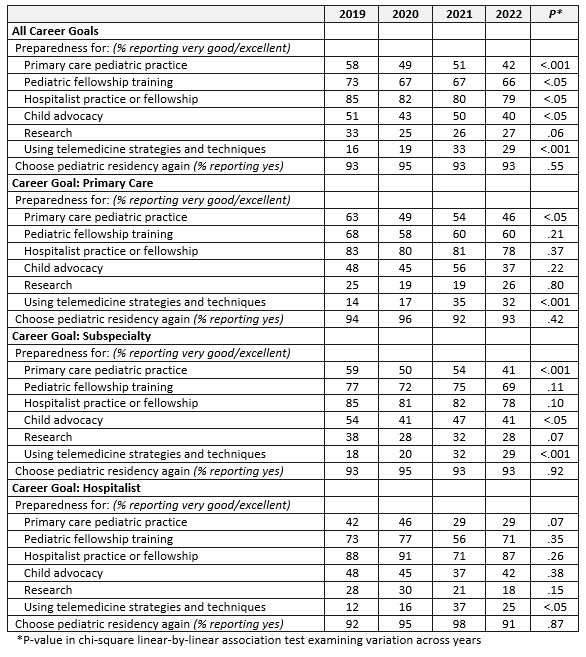Gottschlich E, Kist T, Haftel H
Presented at the 2023 Pediatric Academic Societies Annual Meeting
Background: Past research has shown the COVID-19 pandemic posed challenges and prompted changes to pediatric residency programs. It is unclear if the pandemic impacted residents’ preparedness and satisfaction with training.
Objective: Examine pediatric residents’ perceived preparedness and satisfaction with training prior to and during the pandemic (2019 through 2022).
Methods: National random samples of 1000 US pediatric resident graduates from the AAP Annual Survey of Graduating Residents (2019-2022; n=1776). Response rates ranged from 51% (2019) to 38% (2021). Residents reported a career goal after all training is complete (primary care, subspecialty, or hospitalist) and rated how well their program prepared them (5-point scale, “poor” to “excellent”) for 6 career activities: primary care practice, fellowship training, hospitalist practice or fellowship, child advocacy, research, and using telemedicine. Overall satisfaction defined as choosing to do a pediatrics residency again (yes/no). Chi-square linear-by-linear association examined preparedness for the 6 career activities and satisfaction across the 4 years for residents overall and within each career goal.
Results: Across the 4-year study period, 37% reported a career goal of primary care, 51% subspecialty, and 12% hospitalist. Among all residents, 58% rated their program as very good or excellent at preparing them for primary care practice in 2019; by 2022 this decreased to 42% (p<.001). Preparedness for fellowship training, hospitalist practice, and child advocacy also declined overall (Table). The percent reporting very good/excellent preparedness for using telemedicine rose from 16% overall in 2019 to 29% in 2022 (p<.001). Over 9 in 10 residents reportedly would choose a pediatrics residency again, with no significant time change overall. Few differences were found when preparedness and satisfaction were examined within each career goal (Table). For example, the decline in primary care preparedness was significant among those with primary care (63% in 2019, 46% in 2022, p<.05) and subspecialty (59% in 2019, 41% in 2022, p<.001) goals, and the increase in preparedness for telemedicine held true within all 3 career goals.
Conclusion: Residents with a primary care career goal felt less prepared for primary care practice over time, with just 4 in 10 reporting very good or excellent preparation in 2022. The only area examined that showed an increase in preparedness was telemedicine. Across years and career goals, nearly all residents were satisfied with their residency training and would choose to do a pediatrics residency again.
Table 1. Pediatric residents’ reported preparedness and satisfaction with residency training by graduation year and within career goal, 2019-2022
Last Updated
05/22/2023
Source
American Academy of Pediatrics